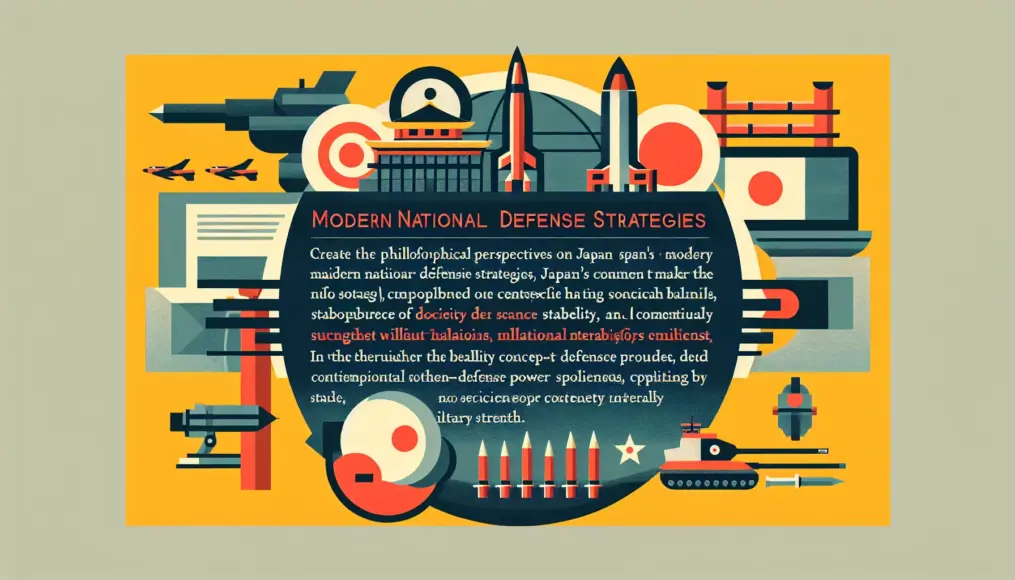Japan’s approach to security goes far beyond just military considerations; it is deeply intertwined with the nation’s culture. A look back at history reveals that Japan’s security landscape has always been shaped by cultural influences, while also contributing to the evolution of its culture. This perspective allows us to delve into how Japan’s security and cultural elements interact with each other.
In this article, we will clarify the definition of Japan’s security and its historical context, examining how both traditional and contemporary cultural factors have impacted security policies. We will also discuss the role of culture in policy-making and address challenges that lie ahead for future security. Let’s take this opportunity to deepen our understanding of Japan’s security landscape.
- Understanding the connection between Japan’s security and culture
- The influence of traditional and modern culture on security
- The significance of culture in future security initiatives
What Does Japan’s Security Mean?
Japan’s security encompasses a wide range of strategies and policies aimed at ensuring the nation’s safety. It’s not just about military power; economic stability, diplomacy, and cultural factors all play a significant role. Considering Japan’s historical context, it’s clear that the post-war pacifism and shifts in international relations have greatly influenced the country’s approach to security.
In this section, we’ll delve into the definition of security and explore Japan’s historical background in detail. This will help us understand the foundational factors behind current security policies and lay the groundwork for contemplating future developments.
Defining Security
Security refers to the measures a nation takes to protect its citizens and territory from external threats. This concept includes not only military defense strategies but also economic stability and international cooperation. Influenced by post-war pacifism, Japan has emphasized security through diplomacy and economic means rather than relying solely on military power.
Today, new threats like cyberattacks and terrorism also loom large. Addressing these challenges requires a flexible approach that transcends traditional security frameworks.
- Security encompasses a nation’s defense and includes various elements
- Japan prioritizes non-military means due to its pacifist tradition
- A flexible approach is necessary to tackle modern threats
Japan’s Historical Context
The history of Japan’s security dates back to the Sengoku period and has evolved significantly through the Meiji Restoration to the post-war pacifist constitution. Particularly after World War II, Japan established a security treaty with the United States, which limited its military role while allowing it to solidify its standing in the international community.
This historical backdrop has profoundly shaped Japan’s current security policies. As international tensions rise and the regional security environment changes, Japan is compelled to reassess its strategies. Reflecting on history can provide valuable insights into the future direction of its security strategy.
- Japan’s security has undergone significant historical changes
- The post-war pacifist constitution and the treaty with the U.S. are crucial elements
- Current security policies must be revisited in light of historical context
The Impact of Culture on National Security
Culture plays a vital role in Japan’s national security. Traditional values and cultural backgrounds not only influence national security policies but are also deeply embedded in the consciousness and attitudes of the citizens. This chapter explores how both traditional and contemporary cultures impact security.
Japan’s approach to national security encompasses more than just military defenses; it is also shaped by cultural factors. This understanding allows us to see how the awareness and actions of citizens are connected to the country’s security. By reflecting deeply on the relationship between culture and security, we can gain valuable insights that may inform future policy-making.
Traditional Culture and National Security
Japan’s traditional culture has historically exerted a significant influence on security matters. Concepts like Bushido (the way of the warrior) and the spirit of Wa (harmony) have shaped the citizens’ attitudes and awareness regarding national defense. These values foster unity and cooperation among the populace, serving as crucial elements in safeguarding the nation.
Additionally, traditional culture also influences diplomacy. Japan’s unique customs and traditions play an essential role in building international relationships. As a result, Japan’s security policies are evolving towards fostering cooperative ties based on cultural understanding.
- Traditional culture influences citizens’ consciousness and attitudes
- Bushido and the spirit of Wa promote unity
- Culture shapes cooperative relationships in international affairs
Contemporary Culture and Policy Evolution
Modern culture is another key factor impacting security policies. In an increasingly globalized world, where information and values spread rapidly, citizens’ awareness and needs have diversified. In such an environment, the style of security that citizens seek is also changing.
Particularly among younger generations, advancements in technology and communication have led to a new recognition of threats, making them feel that traditional defense strategies are inadequate. Consequently, the government is compelled to explore new security policies that incorporate cultural elements and adopt a more flexible approach.
For those interested in this topic, we recommend reading the article “Considering the History and Future Perspectives of the Okinawa Issue.” This piece delves deeper into the cultural factors and historical context of Japan’s national security through the lens of the Okinawa issue, helping to enhance your understanding.
- Contemporary culture diversifies citizens’ awareness
- Globalization has led to recognition of new threats
- A flexible security policy that incorporates cultural elements is necessary
The Role of Culture in Security Policy
Security policy is a crucial framework for ensuring a country’s defense and safety, and it is deeply intertwined with cultural factors. The values and cultural backgrounds of the populace play a significant role in shaping and implementing these policies. In this chapter, we will explore how cultural influences impact security policy.
Culture serves as a foundation for guiding policy direction and gaining public support. Therefore, understanding cultural factors is essential for formulating more effective security policies. Let’s take a closer look at how culture is involved in security policy.
The Importance of Cultural Factors
Cultural factors greatly influence how citizens feel about and respond to security issues. For instance, in countries where traditional values are strong, the populace tends to have a heightened awareness of defense matters. This often makes it easier for the government to garner support for proposed security policies.
Moreover, cultural factors also affect international cooperation and relationship-building. Countries with cultural commonalities are more likely to establish robust security partnerships. Thus, understanding and respecting culture is vital for the success of security policies.
- Cultural factors influence public awareness
- Traditional values enhance defense consciousness
- Cultural commonalities promote international cooperation
Impact on Policy Formulation
Culture functions as a crucial element in the formation of security policy. Governments need to consider the cultural backgrounds of their citizens when crafting policies. This approach helps ensure that policies are more easily understood and supported by the public.
Furthermore, culture also influences the implementation of policies. When policies are executed in a culturally acceptable manner, they are expected to yield more effective results. Therefore, cultural factors cannot be overlooked in the policy formulation process.
For those interested in deepening their understanding of how cultural factors influence security policy, we recommend the article “Is It Necessary to Amend Article 9 of the Japanese Constitution? Exploring Its True Intent.” This piece provides a multifaceted analysis of the background of constitutional amendments, the positions of various political parties, and perspectives from the international community, serving as a valuable reference for considering the impact of culture on policy formation.
- Policies that consider cultural backgrounds are essential
- Implementing policies in an acceptable manner is effective
- Ignoring cultural factors in policy formulation should be avoided
The Relationship Between Future Security and Culture
As we look ahead, culture is expected to play an increasingly vital role in future security. With new technologies and international challenges emerging, incorporating cultural perspectives will be key to developing effective security policies. This chapter will explore upcoming challenges, potential directions, and insights from an international viewpoint.
The future of security must remain flexible to adapt to rapidly changing global circumstances. By understanding and integrating cultural elements, we can build a stronger security framework.
Upcoming Challenges and Directions
One of the greatest challenges in future security is the evolution of technology and its impact. As cyber attacks and information warfare become the norm, traditional defense strategies alone will not suffice. This calls for new approaches that take cultural aspects into account.
Moreover, in our increasingly globalized world, understanding and respecting different cultures is essential. By promoting international cooperation and building shared values, we can achieve more effective security policies. Embracing cultural diversity opens up possibilities for adapting flexibly to a changing security environment.
- The impact of technological evolution on security
- The need for new approaches that consider cultural aspects
- The importance of cultural understanding in promoting international cooperation
Insights from an International Perspective
From an international standpoint, the influence of each country’s culture on security policy formation is significant. Cultural differences can pose barriers to communication and cooperation between nations. Therefore, understanding and respecting culture is crucial in building international relationships.
Additionally, we are entering an era of interdependence in international security. When countries collaborate beyond cultural differences, a safer world becomes achievable. From this perspective, it is clear that culture will be an important factor in future security.
- The influence of cultural differences on policy formation
- The key role of cultural understanding in building international relations
- The significance of culture in an era of interdependence
Conclusion
In this article, we’ve delved into the intricate relationship between Japan’s security and its cultural landscape. It’s clear that security policy is not just about military defenses; cultural factors play a significant role as well. Both traditional and contemporary cultures influence public awareness and behavior regarding security, making them vital elements in shaping policy.
As we look to the future of security, the evolution of technology and the need for international cooperation are becoming increasingly important. By understanding and integrating cultural perspectives, we can expect to develop more effective security policies. Overcoming the challenges ahead and building a sustainable framework for security will require a cultural viewpoint that cannot be overlooked.
- Japan’s security is significantly influenced by cultural factors.
- Traditional and modern cultures contribute to the formation of public awareness.
- Understanding culture is essential for future security.
It’s crucial to continue exploring the connection between security and culture, deepening our understanding as we go. We’d love to hear your thoughts and feedback in the comments!



Comment